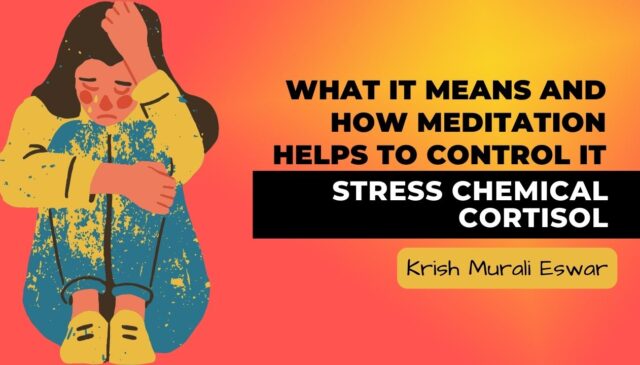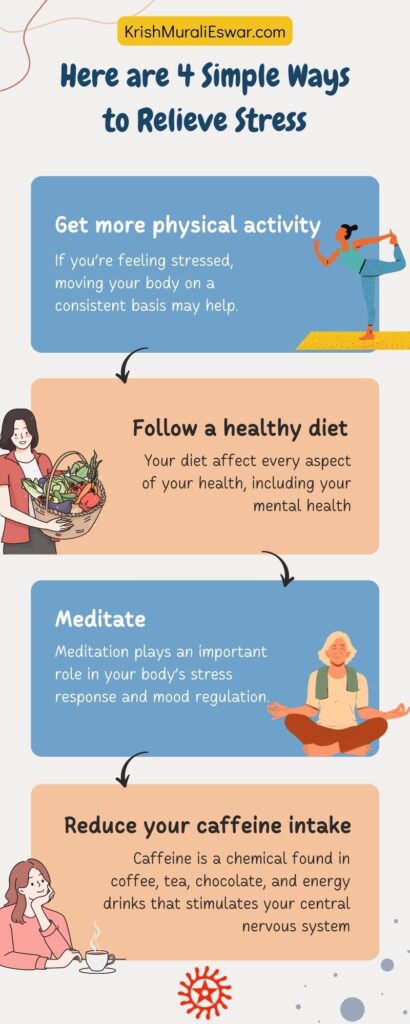
You may have heard about the “stress chemical” known as cortisol. It’s often considered a bad thing because it is one of the main chemicals triggered by experiencing stress, but this hormone has many other roles and does much more than just start a person’s “fight or flight” instincts.
What Is Cortisol?
Cortisol is produced in your adrenal glands, on top of each kidney. The adrenals produce hormones that help you deal with stressful situations. When you’re stressed out, your body releases adrenaline into your bloodstream, which causes your heart rate to increase and your blood pressure to rise. Adrenaline also helps your muscles become tense so they can be used for fighting or running away from danger.
When you experience prolonged stress, your body produces too much cortisol. This excess cortisol can cause you to feel tired, irritable, anxious, depressed, and even have high blood pressure.
Adrenaline and Chronic Stress
While your body needs adrenaline to respond quickly to dangerous situations, chronic exposure to adrenaline can lead to health problems. For example, when constantly exposed to adrenaline, your body will release less of it during times of stress. This means you won’t get the same response from your body when you need it most.
When you are under chronic stress, your body becomes desensitized to adrenaline. Your body doesn’t react to adrenaline as it did before. Instead, it responds to adrenaline by producing more cortisol.
Amygdala and Stress Response
Your amygdala is located deep inside your brain. It controls your emotional responses to fear, anger, and anxiety. The amygdala is responsible for producing the fight-or-flight response when you are faced with something scary.

Your amygdala sends signals to your hypothalamus, telling your pituitary gland to release ACTH (adrenocorticotropic hormone). ACTH triggers the production of cortisol in your adrenal glands.
Positive Effects of Stress Hormone Cortisol
Most of the cell’s contents include cortisol receptors. Because cortisol is so vital in many different areas of our lives, it can be seen why it is involved in various activities. Cortisol helps regulate your metabolic rate, blood sugar level, and blood pressure. It also aids in memory consolidation and helps reduce inflammation within the body. In addition, cortisol reduces pain sensitivity and can help prevent infection.
When we’re stressed out, cortisol is released into our bodies.
Cortisol Responses
The adrenal glands produce cortisol under pressure from certain situations. However, other things in a person’s daily routine can lead to increased production of cortisol.
Individuals who sleep during the day rather than at night have been shown to have higher cortisol levels than those who receive an appropriate amount of sleep at night or have more regular sleep schedules. As expected, those who have insomnia or frequently wake up throughout the night are likely to have elevated cortisol levels. This generally may last around 24 hours depending upon if they can eventually get back into healthier sleep habits, or it may continue if their insomnia persists.
Even though regular physical activity may lead to increased cortisol production in some people, small doses of physical activity (irrespective of its type or duration) may also increase cortisol in others. However, for those individuals who participate in moderate or high-level physical activities, their cortisol will eventually return to normal after a few weeks.
Furthermore, stressed-out individuals may experience high cortisol levels even when they’re not under any type of physical or mental pressure. Negative mindsets and feelings such as guilt, shame or inadequacies may also cause people to produce higher cortisol levels. Stress doesn’t necessarily mean something wrong is happening; sometimes, it just means we have a negative outlook on life.
What effect does cortisol have on the mind?
A high concentration or prolonged elevated cortisol level can negatively affect a person’s mind and mental health. Constantly or intensely exposed can contribute to developing or worsening conditions such as anxiety, depression, and PTSD. When the bodies unable to reset after a period of intense stress, and the excessive release of cortisol maintain a steady state of distress within an individual, this can lead explicitly to the development of depression in those who might already be susceptible to mental illnesses or other mental health issues. Unhealthy amounts of cortisol can alter a person’s DNA and put them at a significantly increased risk of psychological problems.
Serotonin and Cortisol
Elevated serotonin levels over an extended period can help reduce pain, improve sleep quality, and increase energy levels. Serotonin helps regulate moods and emotions, so if you’re feeling anxious, depressed, or stressed out, your body may not be producing enough serotonin to balance things out. In addition, high levels of cortisol can lead to weight gain, fatigue, headaches, muscle aches, and digestive issues. These symptoms can make it difficult to focus and learn and affect your overall health and well-being.
Positive stressors cause the same “stress” responses in the brain and the rest of the human system, but they’re usually beneficial for the person experiencing them.
Too much of the stress-related chemical called glucocorticoid (cortisone) can cause serious side effects. These include fatigue, muscle weakness, decreased immunity, increased blood sugar, and an increase in fat around your belly. High doses of cortisone can also trigger diabetes and osteoporosis. Low chemical amounts can make people depressed, anxious, and tired.
Men with this condition often experience a loss of interest in sex, erectile difficulties, and decreased fertility. Women may experience changes in their menstrual cycles, including increased flow, missed periods, or no periods. Children can experience impaired and delayed growth due to chronic hypercortisolism.
Cushing Syndrome
Cushing syndrome can be either self-induced (caused by the body itself) or induced (triggered by the use of steroids). The overproduction of cortisol can trigger it due to tumour formation in the pituitary gland, adrenal gland, or an ACTH-secreter tumour. Women who become pregnant often experience high cortisol levels during their pregnancies.
If not treated, this condition can lead to serious health issues, including hypertension, type 2 diabetes, loss of muscular strength and bone density, and even death.
Addison’s Disease
Addison’s disease is when the body fails to produce adequate amounts of cortisol. It usually happens over time and goes unnoticed until it becomes severe enough to require medical attention.
Low cortisol levels in an individual can cause various health issues, including low energy, fatigue, stomach pains, and muscle aches. It can also affect women’s sex drive and their ability to get pregnant.
If signs appear suddenly or worsen, Addison’s disease may cause an acute adrenal crisis that could lead to shock and even death if not treated immediately. Some common signs include confusion, extreme fatigue, leg or back pain, delirium or coma, and severe stomach cramps accompanied by diarrhoea.
Adrenal insufficiencies are the main factors associated with Addison’s Disease; however, they may occur from disorders involving the adrenal gland itself, damage to the gland, or the impaired and lowered production of ACTH by the affected person’s pituitary gland (hypocortisolism).
Treatment
When dealing with chronically high cortisol, lifestyle adjustments might be necessary. These include taking better care of yourself (e.g., sleeping well), eating healthily, and exercising regularly.
Meditation and yoga exercises are beneficial in relieving one from the effects of short-term stresses.
Those who suffer from more severe issues might require more drastic measures such as quitting a job or breaking off an unhealthy relationship. Some people can also take advantage of self-help techniques such as visiting a therapist, volunteering at a charity, or indulging in recreational activities to help them overcome some of the stressful life situations that may otherwise be too difficult to handle alone. Self-cares include eating healthy foods, exercising regularly, getting enough sleep, and spending quality time with family members and friends. However, extreme cases such as Cushing’s and Addison’s disease require medical interventions to treat the symptoms caused by excess hormones. These treatments include medication, surgery, and/or radiotherapy.
Don’t hesitate to talk to a doctor if you’re feeling stressed or if any of these issues seem similar to something else you’ve been dealing with.

How does Meditation Help Lower Cortisol Levels Naturally?
Meditation has been shown to decrease cortisol levels naturally. If you suffer from chronic stress, meditation may be an effective tool to help you cope with stress.
When you meditate, you enter a state of relaxation. During meditation, your brain waves slow down and become slower than usual. This allows you to relax and concentrate better.
As your brain waves slow down, your body releases serotonin and dopamine neurotransmitters. Serotonin is associated with feelings of well-being and contentment. Dopamine is associated with pleasure and motivation. A simple way to relax is through gardening therapy. It makes you happy. You can buy good indoor plants for health and set up a garden on your balcony or rooftop.
Beneficial neurotransmitters are also released during meditation and help improve mood and reduce stress.
In addition to reducing stress, meditation can also help us sleep better. Studies suggest that meditating regularly can help prevent insomnia.
You can feel calmer and happier by slowing down and focusing on your life force pulsations. Kundalini is your life force. You can stop the mental chatter using Kundalini Yoga.
A precise definition of meditation is Dhyana, awakening your kundalini and focusing on its gentle vibrations at Ajna, Sahasrara or root chakra. You can visit my article to read about why kundalini awakening is necessary.
Visit a SKY Yoga centre near you and learn Simplified Kundalini Yoga. Kundalini Yoga is safe to practice. If you have any questions, check out my page on Kundalini FAQ.
I want you to know that I am here to help you succeed. If you need some inspiration, read my motivational quotes.
My goal is to help you realize the heaven inside you.
The other end of your mind is almighty force.
Write to me.
Let me know how I can help you succeed.
Looking forward to hearing from you.
I love you, and I thank you for being there as a source of my inspiration.
Be Blessed by the Divine!
Krish Murali Eswar.
Leave a Reply